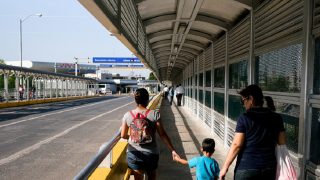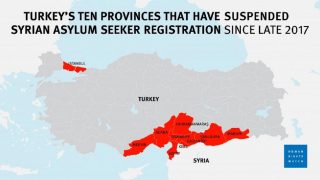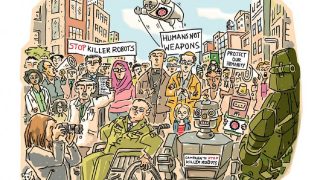Greece is denying thousands of asylum-seeking children their right to an education because of a European Union-backed migration policy that traps them on the Aegean islands.
(Athens) – Greece is denying thousands of asylum-seeking children their right to an education because of an European Union-backed migration policy that traps them on the Aegean islands, Human Rights Watch said today.
The 51-page report, “‘Without Education They Lose Their Future’: Denial of Education to Child Asylum Seekers on the Greek Islands,” found that fewer than 15 percent of more than 3,000 school-age asylum-seeking children on the islands were enrolled in public school at the end of the 2017-2018 school year, and that in government-run camps on the islands, only about 100 children, all preschoolers, had access to formal education. The asylum-seeking children on the islands are denied the educational opportunities they would have on the mainland. Most of those who were able to go to school had been allowed to leave the government-run camps for housing run by local authorities and volunteers.
“Greece should drop its policy of confining child asylum seekers and their families to the islands, since for two years the government has proven incapable of getting these children into school there,” said Bill Van Esveld, senior children’s rights researcher at Human Rights Watch. “Stranding children on islands where they can’t go to school harms them and violates Greece’s own laws.”
Human Rights Watch interviewed 107 school-age asylum-seeking and migrant children on the islands and interviewed Education Ministry officials, UN staff, and local aid groups, and reviewed legislation.
Greece’s government has an EU-backed policy of keeping asylum seekers who arrive by sea from Turkey on the islands until their asylum claims are adjudicated. The government contends this is necessary under the EU-Turkey migration agreement of March 2016. The process is supposed to be quick and members of vulnerable groups are supposed to be exempt. But Human Rights Watch interviewed families who had been stuck for up to 11 months in the camps, often because of long waits for asylum interviews or because they were appealing their rejection.
While the government has transferred more than 10,000 asylum seekers to the mainland since November, it refuses to end the containment policy. Greece’s highest court struck down the policy for new arrivals in April 2018. Instead of implementing the ruling, the government issued an administrative decision and adopted a law to reinstate the policy.
Under Greek law, education is free and compulsory for children ages 5 to 15, including children seeking asylum. International law guarantees all children the same right to primary and secondary education, free from discrimination. Children in camps in mainland Greece, who are not subject to the containment policy, have been able to enroll in formal education.
According to the European Commission’s humanitarian agency, ECHO, “education is crucial” for girls and boys affected by crises. It said that education can “restore their sense of normality and safety,” provide important life skills, and is one of the best investments in “their long-term future, and in the peace, stability and economic growth of their countries.”
A 12-year-old girl from Afghanistan who had been in a government-run camp on the islands for six months said she studied for seven years before fleeing conflict and wanted to go back to school. “If we don’t study, we won’t have a future, and we won’t be successful, because we [won’t be] educated and we can’t speak other languages,” she said.
Several nongovernmental groups provide non-formal education to asylum-seeking children on the islands, but staff said that this is no substitute for formal education. One such school has part-time use of a single prefabricated container in the government-run Moria camp on Lesbos, which means children can receive only 1.5 hours of instruction per day. “They do their best and we are grateful for it, but it’s not a real school,” one father said.
Others provide transportation to off-site schools, but can’t serve children too young to travel there alone. Some students living outside the government-run camps receive non-formal education and were also supported by volunteers or nongovernmental groups to enroll in public school. Volunteers helped a 13-year-old Kurdish boy living in Pikpa, a site outside the camps on Lesbos now threatened with closure, to enroll in public school, where he is already able to study in Greek.
Parents and teachers said that the routine of being able to attend school could help asylum-seeking children recover from traumatic experiences in their home countries and during their flight. But the lack of access to school, combined with gaps in mental health support, exacerbates the stress and anxiety that come from being stuck for months in the insecure, overcrowded camps. A 17-year-old who had been raped in Morocco said that conditions in the Samos camp “make me remember what I went through. I had hoped to be safe.”
Greece’s Ministry for Migration Policy, which is charged with the containment policy and responsibility for the island camps, did not reply to questions from Human Rights Watch about education for asylum-seeking and migrant children on the islands. Several education providers said there has been a lack of transparency about the Migration Ministry’s authority with regard to education on the islands. An Education Ministry committee on refugee education reported in 2017 that the Migration Ministry had blocked some plans to improve access to education on the islands.
The Education Ministry has established two key programs to help asylum-seeking children throughout Greece who do not speak Greek and who may have been out of school for years to integrate and succeed in formal education, but both have excluded most children in government-run camps on the islands.
In 2018, the ministry opened pre-schools in some island camps, and in May about 32 children in a camp run by a local municipality on Lesbos were able to enroll in primary schools, although the school year ended in June. The ministry said that more than 1,100 asylum-seeking children were enrolled in schools on the islands at some point during the 2017-2018 school year, but many apparently left the islands before the end of the year.
A law passed in June provides increased clarity on asylum seekers’ right to education, and on July 9, the Education Ministry told Human Rights Watch that it is planning to open 15 additional classes for asylum seeking children on the islands in the 2018-2019 school year. This would be a positive step if, unlike plans announced in previous years, it is carried out on time. But it would still leave most school-age asylum-seeking and migrant children on the islands out of school unless the number of children decreases.
“Greece has less than two months to ensure that children who risked their lives to reach its shores are able to go to school when the school year begins, a deadline it has never met,” Van Esveld said. “The European Union should encourage Greece to fulfill these children’s right to education by scrapping the containment policy, and allowing asylum seeking children and their families off the islands so they can get the education and services they need.”
Human Rights Watch.Greece: Asylum-Seeking Children Deprived of School. © 2018 by Human Rights Watch.



